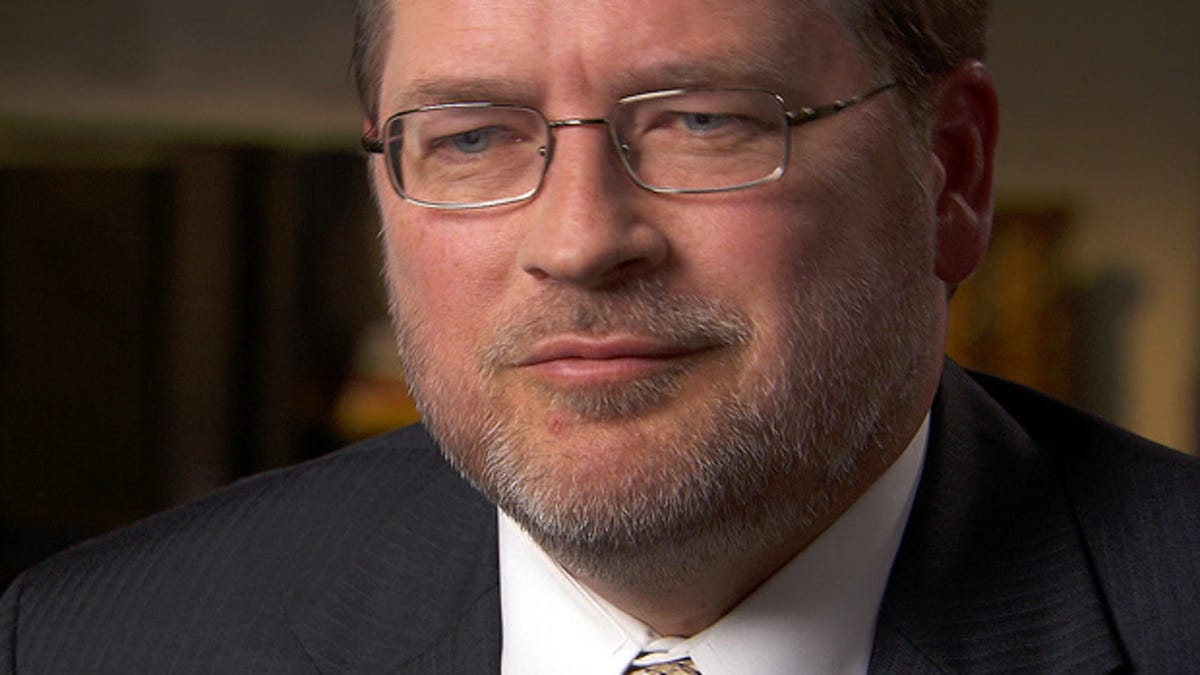Is Grover Norquist breaking up with SOPA?
Americans for Tax Reform President Grover Norquist endorsed the Stop Online Piracy Act last month. Now the high-profile conservative group is expressing concerns about how SOPA would affect free speech and innovation.

Rep. Lamar Smith, chairman of the House Judiciary committee, proudly announced last month that Grover Norquist's Americans for Tax Reform had endorsed his controversial Stop Online Piracy Act.
Smith, a close ally of Hollywood on copyright law, cited ATR by name when saying that his bill enjoys "broad support across the aisle here in the House, across the street in the Senate and across the country." SOPA and a similar bill in the Senate called Protect IP would levy an Internet death penalty against allegedly piratical Web sites.
In the last few weeks, though, the famously combative conservative group, a longtime ally of copyright holders, has become noticeably less enthusiastic about the Hollywood-backed copyright bill.
"I wouldn't say we unequivocally support it," ATR communications director John Kartch told CNET in e-mail this afternoon, referring to a revised version of SOPA that Smith circulated on December 12. Kartch said that SOPA's effects on innovation and free speech online are concerns.
ATR's support for SOPA was important because of the group's high profile in conservative circles: its Taxpayer Protection Pledge became the centerpiece of a nationwide revolt against high taxes, and presidential candidate Newt Gingrich once said that Norquist has "changed American history" as a result. The group appears on a list (PDF) of supporters of SOPA on the House Judiciary committee's Web site.
Its new skepticism is notable because, apart from trade associations such as the Motion Picture Association of America, it would be hard to find any Washington, D.C. advocacy group that has been a more ardent defender of intellectual property rights.
The Property Rights Alliance, a project of ATR, lists combating "piracy and counterfeiting of intellectual property" in its mission statement. Its annual property rights index scores nations on variables including how "effective" each is in eliminating "copyright piracy." The U.S. ranks only 17 worldwide. (Side note: Spain this week enacted a law that closely resembles SOPA.)
But ATR's enthusiasm for stronger copyright laws around the world--including pressing for such language to be inserted into trade agreements--no longer appears to extend to SOPA. The organization says that while Smith offered improvements in the most recent version, "concerns" remain:
We applaud Chairman Smith's commitment to fixing the deficiencies in the original bill and hope the chairman will allow the concerns many have with the remaining parts of the bill to be addressed. The problem of rogue Web sites is a serious problem and it's important to take the time to craft meaningful legislation that tackles infringement, while protecting innovation and free speech online.
ATR was more complimentary three weeks ago, when Norquist, its president, sent a letter (PDF) to Smith saying: "On behalf of Americans for Tax Reform, I want to express my support of the manager's amendment to H.R. 3261, the Stop Online Piracy Act (SOPA), a bill that would help stop foreign rogue Web sites from stealing its intellectual property."
It's not clear why ATR has moderated its position--the group did not immediately respond to subsequent questions from CNET--but criticism of SOPA has grown over the last month. Internet pioneer Vint Cerf said the legislation amounts to "unprecedented censorship" of the Web, and Internet engineers wrote (PDF) a letter to key House and Senate members saying SOPA and Protect IP are not "technically workable."
SOPA, of course, represents the latest effort from the MPAA, the Recording Industry Association of America, and their allies to counter what they view as rampant piracy on the Internet, especially offshore sites such as ThePirateBay.org. It would allow the Justice Department to obtain an order to be served on search engines, Internet service providers, and other companies, forcing them to make a suspected piratical Web site effectively vanish. It's opposed (PDF) by many Internet companies, users, and civil liberties groups.
Conservative and free-market groups, too, have criticized SOPA. As CNET reported last month, the Heritage Foundation raised concerns about how the legislation would affect innovation, security, and free speech. TechFreedom and the Competitive Enterprise Institute have expressed reservations too.
"You could be a vehement supporter of copyright and strong intellectual property laws, but still see problems with this mechanism for enforcement," says Julian Sanchez, a research fellow at the libertarian Cato Institute who has dubbed SOPA "an architecture for censorship."
Sanchez told CNET today that there were "a lot of organizations that had signed on to the general idea" of SOPA but then moderated their positions after the critiques from technologists and security professionals appeared. "A lot of people had second thoughts," he said.
The debate over SOPA in Smith's House Judiciary committee is expected to resume this month; a Senate floor vote on Protect IP will begin on January 24.

